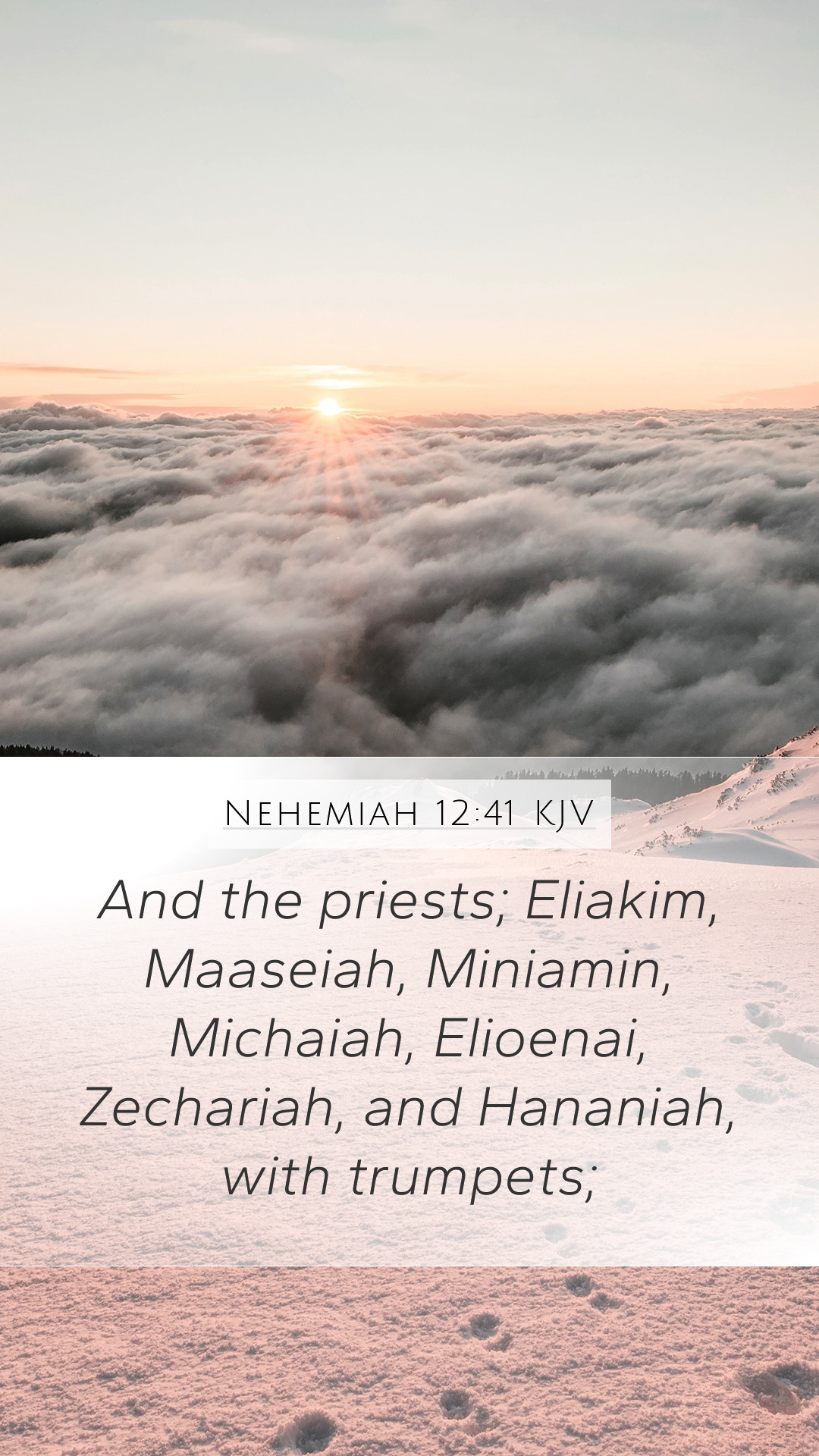Understanding Nehemiah 12:41
Nehemiah 12:41 states: "And the singers sang loud, with Jezrahiah their director. And they offered great sacrifices that day, and rejoiced: for God had made them rejoice with great joy: the wives also and the children rejoiced: so that the joy of Jerusalem was heard even afar off."
This verse encapsulates a moment of profound celebration and worship within the community of Jerusalem following their return from exile. It emphasizes the joy that comes from communal worship and the acknowledgment of God's blessings.
Bible Verse Commentary
-
Matthew Henry’s Commentary:
Matthew Henry interprets this verse as an emblem of the restored worship in Jerusalem. He highlights the roles of the singers and the importance of joyful worship in bringing the congregation together, indicating that their rejoicing was not just for personal joy but meant to honor God. The mention of the director, Jezrahiah, signifies organization in worship, which reflects a well-ordered community.
-
Albert Barnes’ Commentary:
Albert Barnes notes that the loud singing speaks to the exuberance of the joyful occasion. It reflects the deep-seated gratitude of the community for God's deliverance and favor. Furthermore, he underscores that the sacrifices made were not merely ritualistic but were expressions of genuine thanksgiving. The happiness expressed by the wives and children emphasizes that this joy permeated all levels of society.
-
Adam Clarke’s Commentary:
Adam Clarke emphasizes the significance of the children's inclusion in the celebration, which illustrates the way joy in God's blessings can be a communal experience spanning generations. Clarke observes that this moment serves as a memorial of God’s faithfulness, which should lead the people to continue in their commitments and faithfulness to God’s commands in the future.
Significance in Biblical Context
The joy expressed in Nehemiah 12:41 is significant as it represents the culmination of the efforts of Nehemiah and the returned exiles to rebuild not just the physical walls of Jerusalem, but also the spiritual walls of the community. The participation of everyone—men, women, and children—highlights a deeply ingrained culture of worship that acknowledges God’s sovereignty and blessings. This reinforces the idea that Joy in the Lord leads to communal celebration and acts as a witness to others about God’s goodness.
Cross References
- Psalm 30:5: "For his anger endureth but a moment; in his favor is life: weeping may endure for a night, but joy cometh in the morning."
- Ezra 3:11: "And they sang together by course in praising and giving thanks unto the Lord; because he is good, for his mercy endureth forever toward Israel."
- Zephaniah 3:17: "The Lord thy God in the midst of thee is mighty; he will save, he will rejoice over thee with joy; he will rest in his love, he will joy over thee with singing."
Application of Nehemiah 12:41
Modern readers can gather important lessons from Nehemiah 12:41 that apply to their daily lives. The first is the importance of community in worship and joy. Believers today are encouraged to gather together regularly for worship, praising God collectively, and participating in the community of faith.
-
Communal Worship:
Engaging in communal worship checks the individual’s faith journey against the corporate nature of religious life. It fosters connections among believers that can uplift and strengthen spiritual growth.
-
Joy in God's Blessings:
Recognizing and celebrating God’s presence in our lives leads to deeper joy. Just as the people in Nehemiah’s time rejoiced in God’s goodness, modern believers are called to acknowledge and celebrate His many blessings, thereby cultivating gratitude in their lives.
-
Inclusivity in Celebration:
The participation of people from all walks of life—men, women, and children—illustrates the need for inclusivity within faith communities. Everyone's voice is essential in worship, reflecting the kingdom of God where all are valued and celebrated.
Conclusion
Nehemiah 12:41 serves as a powerful reminder of the vitality of joy in worship and the collective spirit of gratitude that should characterize the life of believers. By studying this verse through the insights of notable Biblical commentators, we gain deeper understanding and appreciation of its applications today. Whether in Bible study groups or individual reflection, we can draw inspiration from this scripture as we celebrate God’s presence and provisions in our lives.


